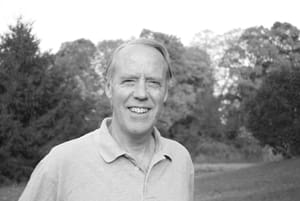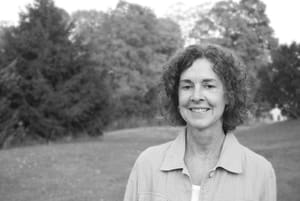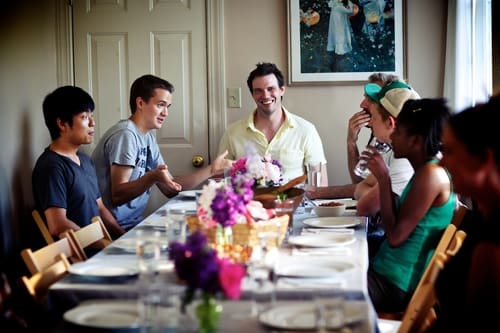 Dick & Mardi Keyes together run L’Abri Fellowship in Southborough, Massachusetts.
Dick & Mardi Keyes together run L’Abri Fellowship in Southborough, Massachusetts.
Dick and Mardi have worked for L’Abri Fellowship in Switzerland and in England, where Dick served also as a pastor in the International Presbyterian Church in London. He has been an adjunct professor at Gordon Conwell Seminary and Westminster Theological Seminary in Philadelphia. He is the author of Beyond Identity and several other books, and is now working on a book about the questions of Jesus.
Mardi’s work includes hospitality, tutoring students, and lecturing. She speaks at L’Abri and at conferences, colleges, and universities in and outside the United States. Mardi has published a number of articles, and a booklet entitled Feminism & the Bible. She also contributed a chapter to the book, Women and the Future of the Family.
In your work, what are you creating, and what are you cultivating? (In Andy Crouch’s vernacular, what new culture are you making, and what good culture are you conserving and nurturing?)
Dick & Mardi Keyes: L’Abri is the French word for “shelter.” We are trying to create a residential study community which is a shelter both from destructive and de-humanizing forces in society, but also from doubts unaddressed, questions put under the carpet and many issues that our culture does not want to raise. We are blessed with a beautiful property and try to model God’s beauty in hospitality. People stay with us in our homes. The minimum age is eighteen and there is no upper age limit. We call them all “students.” All students have tutors who help them work out individual plans of study which are altered and adjusted each week. Half of each day is spent studying and the other half working in whatever is the need of the moment to keep the place running. There is a big emphasis on discussion, both in groups and also one on one. Meals are important. They are in our own homes, which are part of the community and much discussion happens in the informality of these meals, washing dishes afterward, and so on.
 |
This setting that we create provides an environment for our students to be exposed to a wide range of Christian truth in a relatively short time—taught, lived, and open to be challenged. We spend much time talking about what Christian truth is and is not and also how we can know it to be true. What we are cultivating, with God’s help, is drawing a wide range of people closer to God in the breadth of their lives.
Who is the “public” for your work—who is it for, and how does it affect the lives of those who engage with it?
We see our “public” in three concentric circles. The inner circle, which takes up most of our time and energy, is made up of the students who are actually living with us, 24/7. Almost always some are not Christians, wanting to investigate the faith, but most are Christians of some sort. They may be cynical about the church, the Bible, or God himself. They may come wanting to study particular issues such as identity, vocation, or apologetics, or deal with more theological, philosophical, psychological, or social issues. They have the full range of academic background—from no high school degree to one or two Ph.D.s. From wherever they are, we try to take them forward to a deeper grasp of God’s truth.
 |
The next circle is made up of people living in our general area who are in some way connected to the work and who often come to our public lectures/discussions on Friday nights. For them, I think L’Abri represents a place to go where you can ask questions and deal with difficult issues—all of which might not happen in their churches.
The third circle is the wider world. Those of us who do most of the teaching also travel to speak at conferences all over the world and as time allows, try to write in order to have a wider voice. These efforts inevitably involve a more superficial engagement with people than we can have with the people living in our homes, but the speaking trips and the books written do contribute something and also bring people to our branches.
Why do you do what you do?
The short answer is that we have seen the great power of life in a community setting to be able to communicate Christian truth in a short time and deeply, even to people who might be well-defended against it. If this statement were broken down, there would be many elements in it. The context is informal and “non-professional” which encourages honesty and trust. The study curriculum is totally flexible. A student came wanting to study prayer and I started him off with several days work on prayer. The next day he came and said, “Actually, I’m not so sure there’s a God,” at which point I said, “Okay,” and completely changed his plan of study. We love that freedom. We value the uniquely holistic context of L’Abri, which includes study, prayer and singing, meals, teaching, discussion, work, and play. The reality of hospitality means that students get to see family life, our children at various ages, how we raise them, and many other areas of life at close range. They also learn to work (if they don’t already know).
Personally, we (Mardi and Dick) have found that this setting has provided an expansive freedom to be able study, lecture, and write about a wide range of things that we happen to think are important for people today.
What skills, proficiencies, and virtues does this work develop in you?
It is a L’Abri principle to do no advertising or fund raising, but to pray for the right people to come, for our practical needs and for God’s direction of the work. As you can imagine, this “forces” a very real faith and dependence on Him for everything. Over the years, we have learned better how to listen (actively), to empathize, to appreciate each person’s unique story, and to trust God in hope and patience for the people we serve. Hospitality daily challenges us to be generous with our time and possessions and to handle “property damage” with (hopefully) growing grace. Community life is often defined by interruptions. We struggle with this, but hope that we have grown in accepting the frustrations of that calling.
What five books would you recommend to someone interested in understanding or pursuing the sort of work you do?
- Edith Schaeffer: L’Abri (the story of how L’Abri began)
- Francis Schaeffer: The God Who is There (dated but still very relevant)
- Dietrich Bonhoeffer: Life Together
- Dick Keyes: Seeing Through Cynicism, and also Chameleon Christianity
- Ranald Macaulay and Jerram Barrs: Being Human
What do you do for fun?
Dick: I enjoy playing guitar—blues and ragtime—and this is important to me as self-therapy. I get a lot of pleasure from working in the woods—logging and doing forestry work. Although it is impossible for me to separate fun from work in this area, I enjoy reading widely. Finally, it is a great source of joy to be with family, especially with the arrival and growth of grandchildren.
Mardi: I enjoy gardening (vegetables, flowers, and general landscaping), playing piano and singing, and listening to a wide variety of music. I love reading and walking (especially on Crane’s beach). I enjoy “good” (recognizing that could be seen as a subjective adjective!) movies for fun and relaxation. I treasure time with our three sons, their wives and children, as well as with my siblings and other close friends.
 |
 |
Contact the Keyes at southborough@labri.org.



